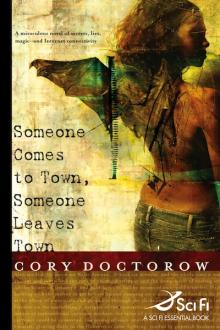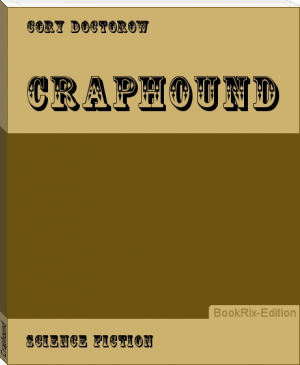Someone Comes to Town, Someone Leaves Town by Cory Doctorow (graded readers TXT) 📕

- Author: Cory Doctorow
- Performer: 0765312786
Book online «Someone Comes to Town, Someone Leaves Town by Cory Doctorow (graded readers TXT) 📕». Author Cory Doctorow
The graybeard passed his unit on to the others at the table.
"Does it work?" he said.
"Yeah," Kurt said.
"Well, that's pretty cool," he said.
Kurt blushed. "I didn't write the firmware," he said. "Just stuck it together from parts of other peoples' projects."
"So, what's the plan?" Lyman said. "How many of these are you going to need?"
"Hundreds, eventually," Alan said. "But for starters, we'll be happy if we can get enough to shoot down to 151 Front."
"You're going to try to peer with someone there?" The East Indian woman had plugged the AP into a riser under the boardroom table and was examining its blinkenlights.
"Yeah," Alan said. "That's the general idea." He was getting a little uncomfortable -- these people weren't nearly hostile enough to their ideas.
"Well, that's very ambitious," Lyman said. His posse all nodded as though he'd paid them a compliment, though Alan wasn't sure. Ambitious could certainly be code for "ridiculous."
"How about a demo?" the East Indian woman said.
"Course," Kurt said. He dug out his laptop, a battered thing held together with band stickers and gaffer tape, and plugged in a wireless card. The others started to pass him back his access points but he shook his head. "Just plug 'em in," he said. "Here or in another room nearby -- that'll be cooler."
A couple of the younger people at the table picked up two of the APs and headed for the hallway. "Put one on my desk," Lyman told them, "and the other at reception."
Alan felt a sudden prickle at the back of his neck, though he didn't know why -- just a random premonition that they were on the brink of something very bad happening. This wasn't the kind of vision that Brad would experience, that far away look followed by a snap-to into the now, eyes filled with certitude about the dreadful future. More like a goose walking over his grave, a tickle of badness.
The East Indian woman passed Kurt a VGA cable that snaked into the table's guts and down into the riser on the floor. She hit a button on a remote and an LCD projector mounted in the ceiling began to hum, projecting a rectangle of white light on one wall. Kurt wiggled it into the backside of his computer and spun down the thumbscrews, hit a button, and then his desktop was up on the wall, ten feet high. His wallpaper was a picture of a group of black-clad, kerchiefed protesters charging a police line of batons and gas-grenades. A closer look revealed that the protester running in the lead was probably Kurt.
He tapped at his touchpad and a window came up, showing relative strength signals for two of the access points. A moment later, the third came online.
"I've been working with this network visualizer app," Kurt said. "It tries to draw logical maps of the network topology, with false coloring denoting packet loss between hops -- that's a pretty good proxy for distance between two APs."
"More like the fade," the graybeard said.
"Fade is a function of distance," Kurt said. Alan heard the dismissal in his voice and knew they were getting into a dick-swinging match.
"Fade is a function of geography and topology," the graybeard said quietly.
Kurt waved his hand. "Whatever -- sure. Geography. Topology. Distance. It's a floor wax and a dessert topping."
"I'm not being pedantic," the graybeard said.
"You're not just being pedantic," Lyman said gently, watching the screen on which four animated jaggy boxes were jumbling and dancing as they reported on the throughput between the routers and the laptop.
"Not just pedantic," the graybeard said. "If you have a lot of these boxes in known locations with known nominal throughput, you can use them as a kind of sensor array. When throughput drops between point foo and point bar, it will tell you something about the physical world between foo and bar."
Kurt looked up from his screen with a thoughtful look. "Huh?"
"Like, whether a tree had lost its leaves in the night. Or whether there were a lot of people standing around in a normally desolate area. Or whether there are lots of devices operating between foo and bar that are interfering with them."
Kurt nodded slowly. "The packets we lose could be just as interesting as the packets we don't lose," he said.
A light went on in Alan's head. "We could be like jazz critics, listening to the silences instead of the notes," he said. They all looked at him.
"That's very good," Lyman said. "Like a jazz critic." He smiled.
Alan smiled back.
"What are we seeing, Craig?" Lyman said.
"Kurt," Alan said.
"Right, Kurt," he said. "Sorry."
"We're seeing the grid here. See how the access points go further up the spectrum the more packets they get? I'm associated with that bad boy right there." He gestured to the box blinking silently in the middle of the board room table. "And it's connected to one other, which is connected to a third."
Lyman picked up his phone and dialed a speed-dial number. "Hey, can you unplug the box on my desk?"
A moment later, one of the boxes on the display winked out. "Watch this," Kurt said, as the remaining two boxes were joined by a coruscating line. "See that? Self-healing. Minimal packet loss. Beautiful."
"That's hot," Lyman said. "That makes me all wet."
They chuckled nervously at his crudity. "Seriously."
"Here," Kurt said, and another window popped up, showing twenty or more boxes with marching ant trails between them. "That's a time-lapse of the Kensington network. The boxes are running different versions of the firmware, so you can see that in some edge cases, you get a lot more oscillation between two similar signals. We fixed that in the new version."
The graybeard said, "How?"
"We flip a coin," Kurt said, and grinned. "These guys in Denmark ran some simulations, proved that a random toss-up worked as well as any other algorithm, and it's a lot cheaper, computationally."
"So what's going on just to the northeast of center?"
Alan paid attention to the patch of screen indicated. Three access points were playing musical chairs, dropping signal and reacquiring it, dropping it again.
Kurt shrugged. "Bum hardware, I think. We've got volunteers assembling those boxes, from parts."
"Parts?"
Kurt's grin widened. "Yeah. From the trash, mostly. I dumpster-dive for 'em."
They grinned back. "That's very hot," Lyman said.
"We're looking at normalizing the parts for the next revision," Alan said. "We want to be able to use a single distro that works on all of them."
"Oh, sure," Lyman said, but he looked a little disappointed, and so did Kurt.
"Okay, it works," Lyman said. "It works?" he said, nodding the question at his posse. They nodded back. "So what can we do for you?"
Alan chewed his lip, caught himself at it, stopped. He'd anticipated a slugfest, now he was getting strokes.
"How come you're being so nice to us?" Kurt said. "You guys are The Man." He shrugged at Alan. "Someone had to say it."
Lyman smiled. "Yeah, we're the phone company. Big lumbering dinosaur that is thrashing in the tarpit. The spazz dinosaur that's so embarrassed all the other dinosaurs that none of them want to rescue us."
"Heh, spazz dinosaur," the East Indian woman said, and they all laughed.
"Heh," Kurt said. "But seriously."
"Seriously," Lyman said. "Seriously. Think a second about the scale of a telco. Of this telco. The thousands of kilometers of wire in the ground. Switching stations. Skilled linesmen and cable-pullers. Coders. Switches. Backhaul. Peering arrangements. We've got it all. Ever get on a highway and hit a flat patch where you can't see anything to the horizon except the road and the telephone poles and the wires? Those are our wires. It's a lot of goodness, especially for a big, evil phone company.
"So we've got a lot of smart hackers. A lot of cool toys. A gigantic budget. The biggest network any of us could ever hope to manage -- like a model train set the size of a city.
"That said, we're hardly nimble. Moving a Bell is like shifting a battleship by tapping it on the nose with a toothpick. It can be done, but you can spend ten years doing it and still not be sure if you've made any progress. From the outside, it's easy to mistake 'slow' for 'evil.' It's easy to make that mistake from the inside, too.
"But I don't let it get me down. It's good for a Bell to be slow and plodding, most of the time. You don't want to go home and discover that we've dispatched the progress-ninjas to upgrade all your phones with video screens and a hush mode that reads your thoughts. Most of our customers still can't figure out voice mail. Some of them can't figure out touch-tone dialing. So we're slow. Conservative. But we can do lots of killer R&D, we can roll out really hot upgrades on the back end, and we can provide this essential service to the world that underpins its ability to communicate. We're not just cool, we're essential.
"So you come in and you show us your really swell and interesting meshing wireless data boxes, and I say, 'That is damned cool.' I think of ways that it could be part of a Bell's business plan in a couple decades' time."
"A couple decades?" Kurt squawked. "Jesus Christ, I expect to have a chip in my brain and a jetpack in a couple decades' time."
"Which is why you'd be an idiot to get involved with us," Lyman said.
"Who wants to get involved with you?" Kurt said.
"No one," Alan said, putting his hands on the table, grateful that the conflict had finally hove above the surface. "That's not what we're here for."
"Why are you here, Alvin?" Lyman said.
"We're here because we're going into the moving-data-around trade, in an ambitious way, and because you folks are the most ambitious moving-data-around tradespeople in town. I thought we'd come by and let you know what we're up to, see if you have any advice for us."
"Advice, huh?"
"Yeah. You've got lots of money and linesmen and switches and users and so forth. You probably have some kind of well-developed cosmology of connectivity, with best practices and philosophical ruminations and tasty metaphors. And I hear that you, personally, are really good at making geeks and telcos play together. Since we're going to be a kind of telco" -- Kurt startled and Alan kicked him under the table -- "I thought you could help us get started right."
"Advice," Lyman said, drumming his fingers. He stood up and paced.
"One: don't bother. This is at least two orders of magnitude harder than you think it is. There aren't enough junk computers in all of Toronto's landfills to blanket the city in free wireless. The range is nothing but three hundred feet, right? Less if there are trees and buildings, and this city is all trees and buildings.
"Two: don't bother. The liability here is stunning. The gear you're building is nice and all, but you're putting it into people's hands and you've got no idea what they're going to do with it. They're going to hack in bigger antennae and signal amplifiers. The radio cops will be on your ass day and night.
"What's more, they're going to open it up to the rest of the world and any yahoo who has a need to hide what he's up to is going to use your network to commit unspeakable acts -- you're going to be every pirate's best friend and every terrorist's safest haven.
"Three: don't bother. This isn't going to work. You've got a cute little routing algorithm that runs with three nodes, and





Comments (0)